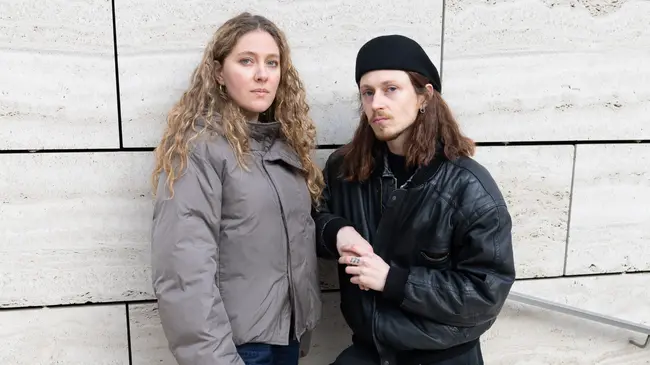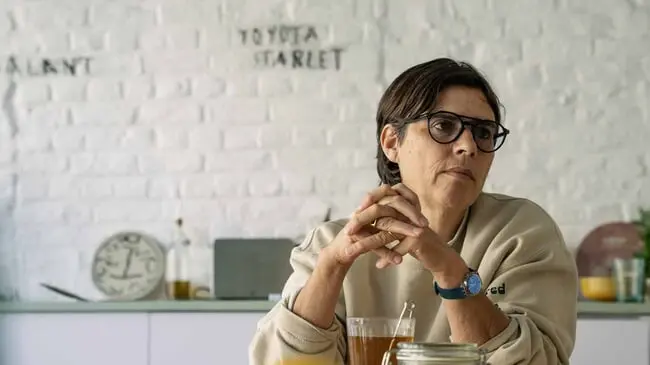I see painting as a laptop that has a lot of tabs open

Nokukhanya Langa’s vibrant and colourful paintings were the light at the end of a tunnel on the grey December morning we went to visit their studio in Ghent. The painter and mixed-media artist was born in Maryland, got their masters in Groningen and is now painting the town red at their 2-year residence at HISK. With collections of wall-size grey paintings filled with imagery in a stream-of-consciousness style and mesmerizing spirals in radiant colours, the studio feels like an eclectic sanctuary.
Combining references to internet culture and real life, they bring the 3D as well as the digital world into a 2D plane. With a group show in Brussels and a solo in Rotterdam coming up, they made time to talk with us about art education and unlearning, their fascination for modern media and collecting references.
You studied in the US as well as in the Netherlands. Can you tell us more about your education?
I knew how to paint in a technical way, but I didn’t feel like an artist
I got my bachelor's degree in the States. I chose to not go to an art school because I felt like I was too young. Instead, I went to a liberal arts college, which is education over various subjects with a focus on what you want to graduate in. The art program in that school was very traditional, with painting for three hours every day. So after graduation, I knew how to paint in a technical way, but I didn’t feel like an artist. I felt isolated from other artists, I had no clue what to do. I took two years off while living in India before starting a master's degree, which I did in Groningen, the Netherlands. That was a good change for me, as suddenly I was surrounded by all these ambitious people pursuing art and all these cultural events and shows. I’ve learned a lot about what art is there, but mostly what it can be.
How has your work developed since graduation?
The good thing about my master’s degree was that it really pushed me to try new things. I think that’s really the point of an institution, it gives you a buffer space to be confident in experimenting. I was visibly less confident in pursuing an experimental approach to working after graduation. Luckily, I had some shows where I could see and learn what my work does on its own and in its own space, without a connection to an institution. That was the first time I stumbled upon these poppy paintings that I am making. I didn’t necessarily find my style during my education, but I did get the tools to search for that individual style.


You’re now in your second year of a 2-year residence at HISK in Ghent. How has that been?
HISK is a nice learning community in the way that people from all around the world with all kinds of careers visit your studio and critique your work. There are also trips organised and lectures by curators who come and talk about their curatorial practice. Even with the COVID19 restrictions, which of course changed this program, it’s not at all the image of the lonely young artist in their little studio.

What does a typical day in your atelier look like?
I come in and sit at my computer, doing all the emails and desk work first. Whether or not I’m painting or preparing to paint, it can be a different process. Sometimes I’m just prepping canvases a whole day, or when I’m preparing to paint I take a lot of time sitting at my laptop collecting images that inspire me or that I want to use for reference in a painting. But when I have a very straightforward idea, like the spiral paintings, I just immediately start.
You mention image collecting, and I see that a lot of your work has references to popular culture. Is the web where you get most of your inspiration?
Yes. Especially recently, since we spent so much time indoors and online. I’m always collecting images, for example, tattoo designs or words out of context. It might just be a tattoo I liked for personal reasons, but then it ends up inspiring me for a painting years later. It’s nice to have a memory bank to look back on. I’m interested in the way people gravitate towards images, they have a really special power over us.


How do you deal with the abundance of content on the internet? When do you have enough documentation?
It’s important to remember not everything has to fit in one painting. I usually work with multiple works forming a collection. I see painting as a laptop that has a lot of tabs open: one painting can be really quiet, or loud or eccentric and still all come together in one collection.
What is something you want to learn?
I think I should learn to be less uptight. I was trained to work with oil paint in a realistic and traditional setting, so part of me has to unlearn to be so rigid in the way I work. I want to keep the techniques I learned but get rid of the mentality, which is intertwined a lot of the time. I want to learn to be freer and feel comfortable breaking out of a painting from time to time. Other media and paintings can work as a constellation. When you’re working in one medium, you build a kind of skillset or muscle memory, it’s important to know you’re able to break out of that as well as use it.


If you were to write a manifesto for the artist, what would your first principle be?
I started painting because I liked it and professionalizing that interest has changed a lot of things
Enjoy it. It sounds so cliché, but it’s so important. If you’re having a bad day or don’t feel like painting, listen to that desire, don’t do it. Same vice versa. I started painting because I liked it and professionalizing that interest has changed a lot of things, I have to remind myself to hold on to that initial fascination.
Different Class works with the interest of their community at heart.
Our work’s purpose is to foster a solid network for independent artists, those who love them, and those who want to support them. Become a member to contribute to the local Belgian art scene.





